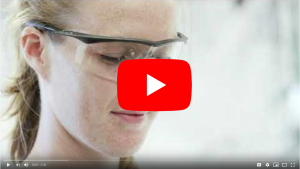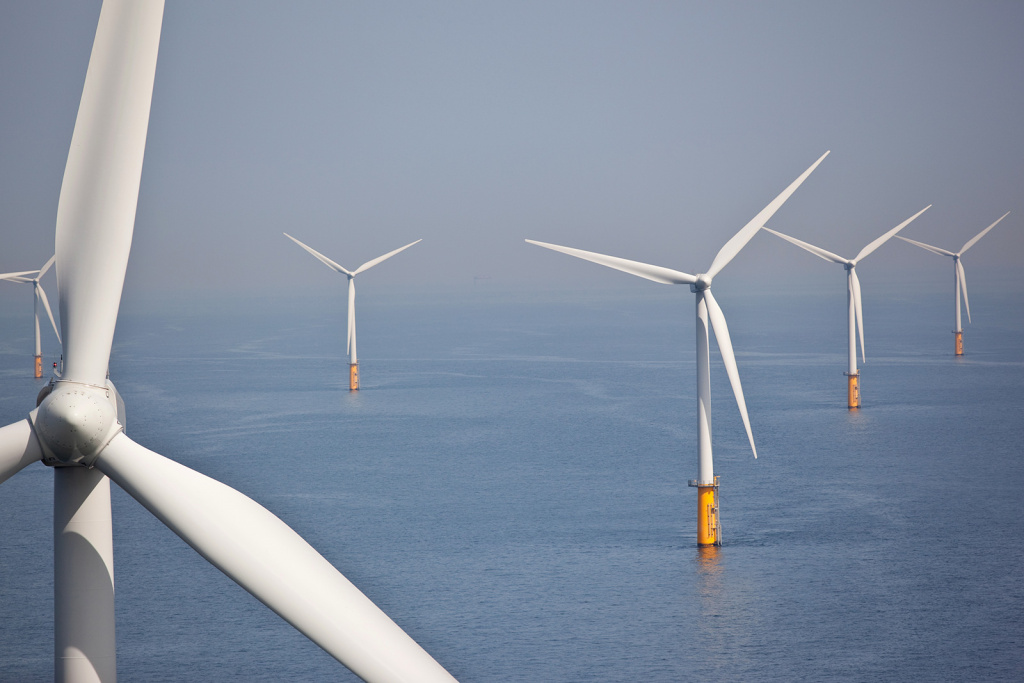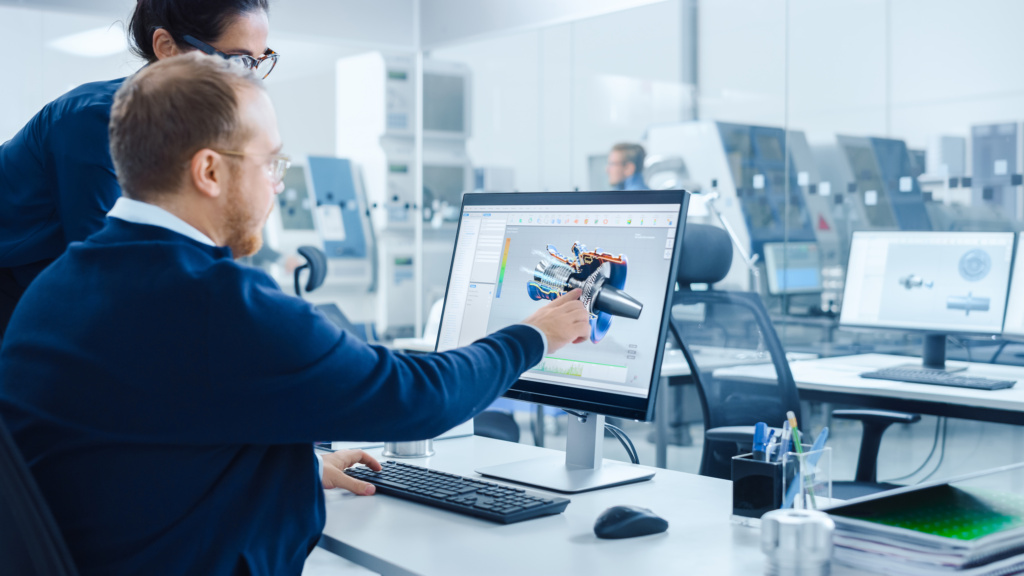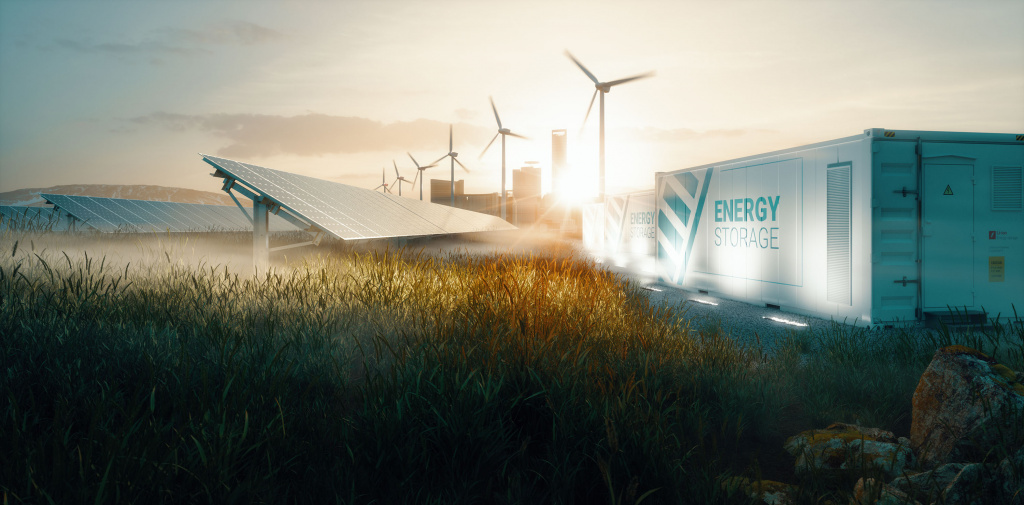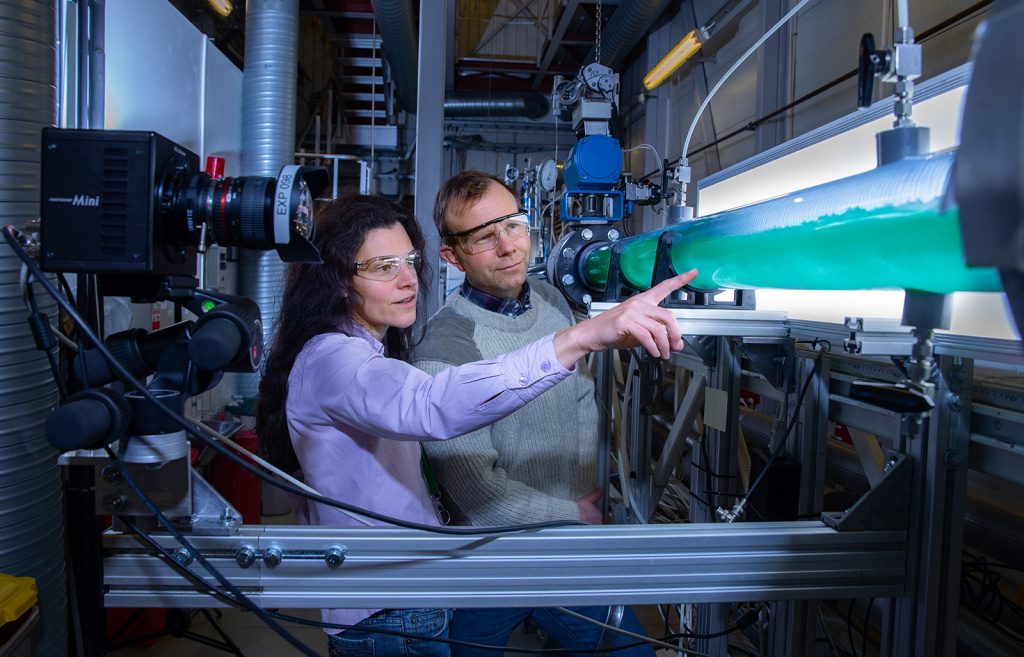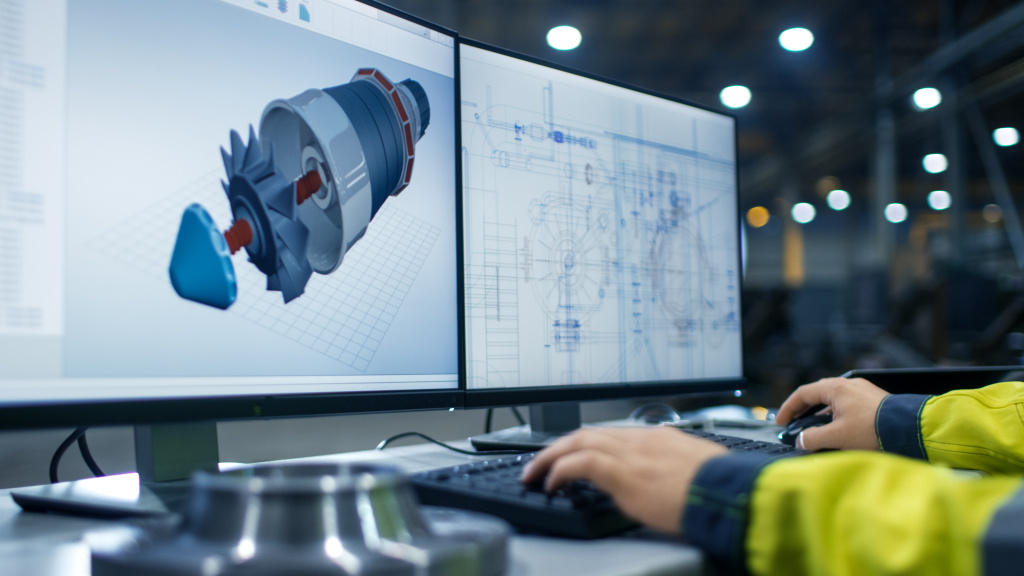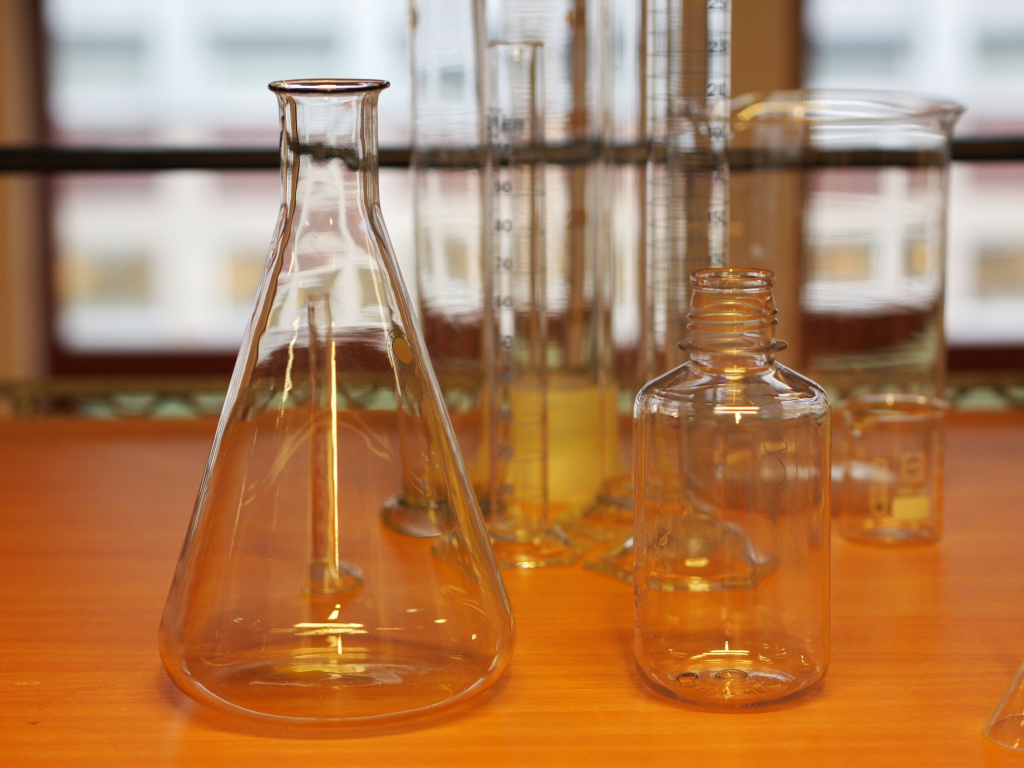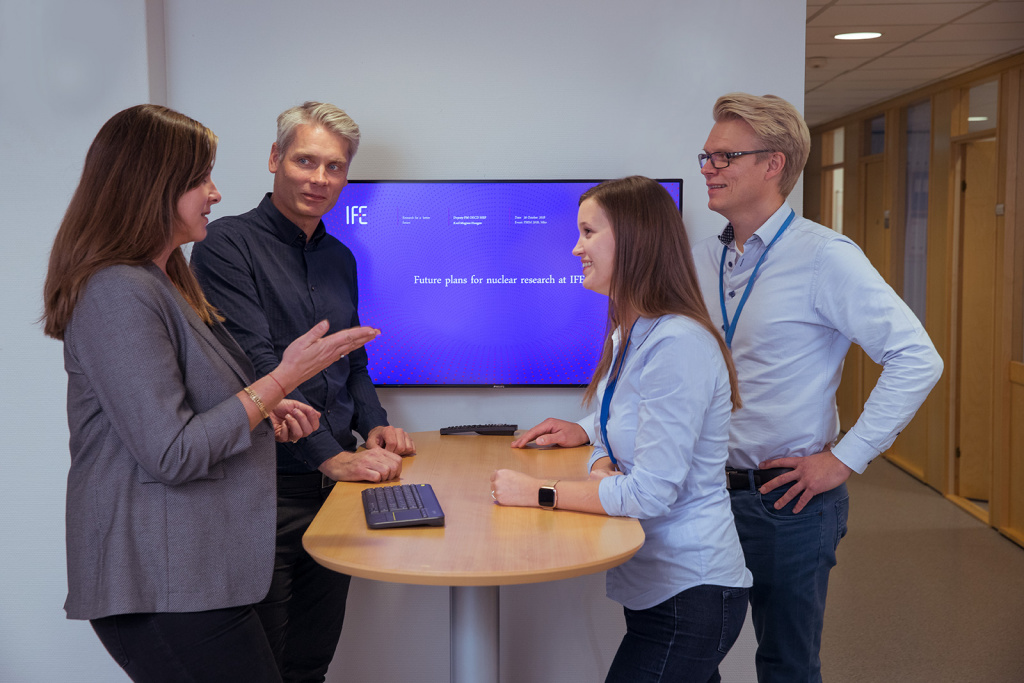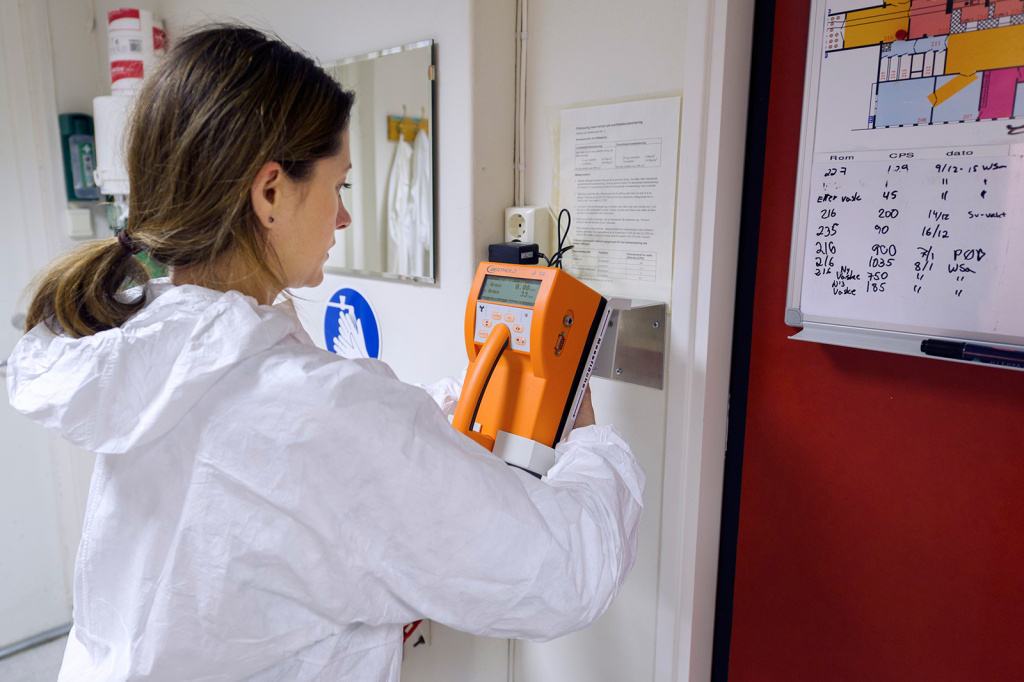Battery Technology
The Battery Technology Department performs research and development on materials, cells and modules level. We work with various partners along the entire value chain to support the development and deployment of the new and emerging battery technologies in Europe.
For a brief overview, please check out this video presentation of IFE’s battery research:
The primary focus areas for the department are battery materials and analysis of lifetime and degradation of commercial batteries.
Battery materials – active materials and electrolytes are the priority topics for modern battery research. Specifically, for the last ten years IFE has been focusing on the development of anode materials for Li-ion and Na-ion batteries, including silicon-based and carbon-based materials. This development led to the discovery of amorphous substoichiometric silicon nitride – a promising material for future Li-ion batteries.
The Battery Technology Department is also involved in research on solid-state batteries – the next promising area where IFE’s research is focused on is interfaces of materials.
The analysis of commercial batteries is another focus area for the department. Batteries are very complex electrochemical systems with many reactions occurring in parallel during battery operation and even storage. Understanding of these processes is key for the prediction of a battery’s lifetime. In close collaboration with various industry partners, we analyze new commercial batteries to better understand usage patterns and ageing of the batteries.
Battery technology is an extremely exciting and rapidly growing area. The combination of multidisciplinary expertise, unique infrastructure and state-of-the-art facilities allows IFE to stay at the forefront of battery technology, while attracting industrial and academic partners throughout the battery value chain.
IFE is proud to be a supporting organization for Battery 2030+ initiative.
What do we do?
Laboratories
Highlighted National Projects
MoreIsLess – Knowledge-building project working towards the design of thick electrodes for Li-ion batteries with optimized balance of energy and power
SEAMLESS – Researcher project aiming to build a platform for materials’ discovery for the batteries of the future by creating a library of silicon-based nanomaterials for the next generation of Li-ion batteries (LIBs)
BATMAN – Norwegian Research Council funded project with Glencore, Elkem, Hydro, Fiven, Agder Energi, NTNU, University of Agder, Transport economical institute and Eyde Cluster, defining the demand for raw materials for the battery value chain, enabling reuse and recycling
SILICAP – Project funded by Regional Research Fund Vestlandet together with Beyonder to develop hybrid battery technology
SAGA – Innovation project for the industrial sector in collaboration with ELKEM and SINTEF aiming to modify the surface of artificial graphite for commercial applications in Li-Ion batteries
Silicon on the Road – How to make silicon-based anodes for Li-ion batteries
NorGiBatF – The Norwegian Giga Battery Factories (NorGiBatF) is a competence project to enable new battery industries to emerge in Norway
BattMarine – Knowledge-building project contributing to enable reliable, safe and economic use of batteries in marine applications, including all-electric and hybridized propulsion systems
SAIL – Silicon Alloys for Lithium-Ion Batteries: researcher project that aims to develop new advanced silicon alloys for high-capacity and long-lifetime batteries
Highlighted European Projects
CoFBAT – H2020 project strengthening the EU competitiveness in advanced materials and related battery value chain by developing a cobalt-free solutions and safe polymer electrolytes.
E-LAND – H2020 project about novel solutions for carbonized energy islands
Hydrogen4Mobility – H2020 MSCA RISE project, addressing critical issues towards a commercial implementation of hydrogen powered utility vehicles
Portable Energy Supply – NATO Emerging Security Challenges Division project, development of hydrogen fuelled portable energy systems
Publications
Highlighted publications
Reviews
Hasa, I.; Mariyappan, S.; Saurel, D.; Adelhelm, P.; Koposov, A. Y.; Masquelier, C.; Croguennec, L.; Casas-Cabanas, M.: Challenges of today for Na-based batteries of the future: From materials to cell metrics. Journal of Power Sources 2021, 482, 228872. https://doi.org/10.1016/j.jpowsour.2020.228872
Hirscher, M.; Yartys, V. A.; Baricco, M.; Bellosta von Colbe, J.; Blanchard, D.; Bowman, R. C.; Broom, D. P.; Buckley, C. E.; Chang, F.; Chen, P.; Cho, Y. W.; Crivello, J.-C.; Cuevas, F.; David, W. I. F.; de Jongh, P. E.; Denys, R. V.; Dornheim, M.; Felderhoff, M.; Filinchuk, Y.; Froudakis, G. E.; Grant, D. M.; Gray, E. M.; Hauback, B. C.; He, T.; Humphries, T. D.; Jensen, T. R.; Kim, S.; Kojima, Y.; Latroche, M.; Li, H.-W.; Lototskyy, M. V.; Makepeace, J. W.; Møller, K. T.; Naheed, L.; Ngene, P.; Noréus, D.; Nygård, M. M.; Orimo, S.-i.; Paskevicius, M.; Pasquini, L.; Ravnsbæk, D. B.; Veronica Sofianos, M.; Udovic, T. J.; Vegge, T.; Walker, G. S.; Webb, C. J.; Weidenthaler, C.; Zlotea, C.: Materials for hydrogen-based energy storage – past, recent progress and future outlook. Journal of Alloys and Compounds 2020, 827, 153548. https://doi.org/10.1016/j.jallcom.2019.153548
El Kharbachi, A.; Zavorotynska, O.; Latroche, M.; Cuevas, F.; Yartys, V.; Fichtner, M.: Exploits, advances and challenges benefiting beyond Li-ion battery technologies. Journal of Alloys and Compounds 2020, 817, 153261. https://doi.org/10.1016/j.jallcom.2019.153261
Anodes for Li-ion batteries
Lai, S. Y.; Mæhlen, J. P.; Preston, T. J.; Skare, M. O.; Nagell, M. U.; Ulvestad, A.; Lemordant, D.; Koposov, A. Y.: Morphology engineering of silicon nanoparticles for better performance in Li-ion battery anodes. Nanoscale Advances 2020. https://doi.org/10.1039/d0na00770f
Ulvestad, A.; Reksten, A. H.; Andersen, H. F.; Carvalho, P. A.; Jensen, I. J. T.; Nagell, M. U.; Mæhlen, J. P.; Kirkengen, M.; Koposov, A. Y.: Crystallinity of silicon nanoparticles: direct influence on the electrochemical performance of Li‐ion battery anodes. ChemElectroChem 2020, accepted. https://doi.org/10.1002/celc.202001108
Prado, F. d.; Andersen, H. F.; Taeño, M.; Mæhlen, J. P.; Ramírez-Castellanos, J.; Maestre, D.; Karazhanov, S.; Cremades, A.: Comparative study of the implementation of tin and titanium oxide nanoparticles as electrodes materials in Li-ion batteries. Scientific Reports 2020, 10 (1), 5503. https://doi.org/10.1038/s41598-020-62505-x
Si-based anodes: advanced characterization
Lai, S. Y.; Knudsen, K. D.; Sejersted, B. T.. Ulvestad, A.; Mæhlen, J. P.; Koposov, A. Y.: Silicon nanoparticle ensembles for lithium-ion batteries elucidated by small-angle neutron scattering. ACS Applied Energy Materials 2019, 2 (5), 3220-3227. https://doi.org/10.1021/acsaem.9b00071
Anodes for Li-ion batteries from industrial Si
Foss, C. E. L.; Müssig, S.; Svensson, A. M.; Vie, P. J. S.; Ulvestad, A.; Mæhlen, J. P.; Koposov, A. Y.: Anodes for Li-ion batteries prepared from microcrystalline silicon and enabled by binder’s chemistry and pseudo-self-healing. Scientific Reports 2020, 10 (1), 13193. https://doi.org/10.1038/s41598-020-70001-5
Andersen, H. F.; Foss, C. E. L.; Voje, J.; Tronstad, R.; Mokkelbost, T.; Vullum, P. E.; Ulvestad, A.; Kirkengen, M.; Mæhlen, J. P.: Silicon-carbon composite anodes from industrial battery grade silicon. Scientific Reports 2019, 9 (1), 14814. https://doi.org/10.1038/s41598-019-51324-4
Silicon nitrides
Ulvestad, A.; Mæhlen, J. P.; Kirkengen, M.: Silicon nitride as anode material for Li-ion batteries: Understanding the SiNx conversion reaction. Journal of Power Sources 2018, 399, 414-421. https://doi.org/10.1016/j.jpowsour.2018.07.109
Ulvestad, A.; Andersen, H. F.; Jensen, I. J. T.; Mongstad, T. T.; Maehlen, J. P.; Prytz, O.; Kirkengen, M.: Substoichiometric silicon nitride – An anode material for Li-ion batteries promising high stability and high capacity. Scientific Reports 2018, 8 (1), 8634. https://doi.org/10.1038/s41598-018-26769-8
Si-nanoparticles: synthesis
Wyller, G. M.; Preston, T. J.; Anjitha, S. G.; Skare, M. O.; Marstein, E. S.: Combination of a millimeter scale reactor and gas chromatography-mass spectrometry for mapping higher order silane formation during monosilane pyrolysis. Journal of Crystal Growth 2020, 530, 125305. https://doi.org/10.1016/j.jcrysgro.2019.125305
Andersen, H. F.; Filtvedt, W.; Maehlen, J. P.; Mongstad, T. T.; Kirkengen, M.; Holt, A.: Production of silicon particles for high-capacity anode material yielding outstanding production capacity. ECS Transactions 2014, 62 (1), 97-105. https://doi.org/10.1149/06201.0097ecst
Solid-state electrolytes
El Kharbachi, A.; Wind, J.; Ruud, A.; Hogset, A. B.; Nygard, M. M.; Zhang, J.; Sorby, M. H.; Kim, S.; Cuevas, F.; Orimo, S. I.; Fichtner, M.; Latroche, M.; Fjellvag, H.; Hauback, B. C.: Pseudo-ternary LiBH4·LiCl·P2S5 system as structurally disordered bulk electrolyte for all-solid-state lithium batteries. Physical Chemistry Chemical Physics 2020, 22, 13872-13879. https://doi.org/10.1039/d0cp01334j
Stability and characterization of Li-ion batteries
Lian, T.; Vie, P. J. S.; Gilljam, M.; Forseth, S.: Changes in thermal stability of cyclic aged commercial lithium-ion cells. ECS Transactions 2019, 89 (1), 73-81. https://doi.org/10.1149/08901.0073ecst
Richter, F.; Kjelstrup, S.; Vie, P. J. S.; Burheim, O. S.: Thermal conductivity and internal temperature profiles of Li-ion secondary batteries. Journal of Power Sources 2017, 359, 592-600. https://doi.org/10.1016/j.jpowsour.2017.05.045
Modelling
Vatani, M.; Szerepko, M.; Vie, P. J. S.: State of health prediction of Li-ion batteries using incremental capacity analysis and support vector regression. IEEE Milan PowerTech 2019, 1 – 6. https://doi.org/10.1109/PTC.2019.8810665
Na batteries
Hasa, I.; Mariyappan, S.; Saurel, D.; Adelhelm, P.; Koposov, A. Y.; Masquelier, C.; Croguennec, L.; Casas-Cabanas, M.: Challenges of today for Na-based batteries of the future: From materials to cell metrics. Journal of Power Sources 2021, 482, 228872. https://doi.org/10.1016/j.jpowsour.2020.228872
Li-MH batteries
El Kharbachi, A.; Zavorotynska, O.; Latroche, M.; Cuevas, F.; Yartys, V.; Fichtner, M.: Exploits, advances and challenges benefiting beyond Li-ion battery technologies. Journal of Alloys and Compounds 2020, 817, 153261. https://doi.org/10.1016/j.jallcom.2019.153261
Nazer, N. S.; Yartys, V. A.; Azib, T.; Latroche, M.; Cuevas, F.; Forseth, S.; Vie, P. J. S.; Denys, R. V.; Sørby, M. H.; Hauback, B. C.; Arnberg, L.; Henry, P. F.: In operando neutron diffraction study of a commercial graphite/(Ni, Mn, Co) oxide-based multi-component lithium ion battery. Journal of Power Sources 2016, 326, 93-103. https://doi.org/10.1016/j.jpowsour.2016.06.105
Ni-MH batteries
Wijayanti, I. D.; Denys, R.; Suwarno; Volodin, A. A.; Lototskyy, M. V.; Guzik, M. N.; Nei, J.; Young, K.; Roven, H. J.; Yartys, V.: Hydrides of Laves type Ti–Zr alloys with enhanced H storage capacity as advanced metal hydride battery anodes. Journal of Alloys and Compounds 2020, 828, 154354. https://doi.org/10.1016/j.jallcom.2020.154354
Yartys, V.; Noreus, D.; Latroche, M.: Metal hydrides as negative electrode materials for Ni–MH batteries. Applied Physics A 2016, 122 (1), 43. https://doi.org/10.1007/s00339-015-9538-9
Hydrogen storage
Yartys, V. A.; Lototskyy, M. V.; Akiba, E.; Albert, R.; Antonov, V. E.; Ares, J. R.; Baricco, M.; Bourgeois, N.; Buckley, C. E.; Bellosta von Colbe, J. M.; Crivello, J. C.; Cuevas, F.; Denys, R. V.; Dornheim, M.; Felderhoff, M.; Grant, D. M.; Hauback, B. C.; Humphries, T. D.; Jacob, I.; Jensen, T. R.; de Jongh, P. E.; Joubert, J. M.; Kuzovnikov, M. A.; Latroche, M.; Paskevicius, M.; Pasquini, L.; Popilevsky, L.; Skripnyuk, V. M.; Rabkin, E.; Sofianos, M. V.; Stuart, A.; Walker, G.; Wang, H.; Webb, C. J.; Zhu, M.: Magnesium based materials for hydrogen based energy storage: Past, present and future. International Journal of Hydrogen Energy 2019, 44 (15), 7809-7859. https://doi.org/10.1016/j.ijhydene.2018.12.212
Our people
Hanne Flåten Andersen, Department Head
Carl Erik Lie Foss, Scientist
Alexey Koposov, Scientist
Marta Koposova, Engineer
Raphael Kuhn, Engineer
Samson Yuxiu Lai, Group Leader Battery Materials
Jan Petter Mæhlen, Group Leader Battery Technology
Marius Uv Nagell, Engineer
Theresa Nguyen, Engineer
Tommy Vikan Nordby, Engineer
Marte Orderud Skare, PhD student
John Ostrander, Scientist
Asbjørn Ulvestad, Scientist
Preben Joakim Svela Vie, Scientist
Julia Wind, Scientist
David Wragg, Scientist
Volodymyr Yartis, Scientist
Monica Christina Økland, Department Coordinator
Services
Battery Testing – testing of batteries, from small-scale coin cells to larger commercial cells and battery modules
Battery Materials Testing – large range of services related to the testing and evaluation of battery materials
